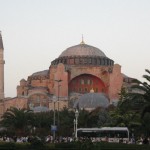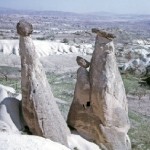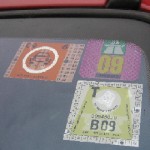
After our three nights in Cappadocia, we then began our return journey to Prague. On Saturday 17th October, we drove around 750 km from Ürgüp to the outskirts of Ankara where we joined the motorway that then took us all the way to Istanbul. As we approached the edge of the Istanbul conurbation, the fine dry and very warm weather we had experienced throughout our time in Turkey, suddenly broke as we drove into an extremely heavy thunderstorm.
We stayed for two nights in Istanbul with a young Turkish couple who we had first met when they couchsurfed with us in Prague earlier in the year in June. In Istanbul, we had our first experience of being couchsurfing guests rather than as couchsurfing hosts. For those who don’t know what couchsurfing is, click on one of the links in this paragraph! Trying to drive to our hosts flat, located in the Asian suburbs of the city, in the midst of the horrors of the Saturday early evening traffic, is an experience I do not wish to repeat for a long, long time!
On the Sunday morning, by taxi and then by ferry across the Bosphorus, we reached the centre of the city and attended the Sung Eucharist at Christ Church, Istanbul. Here we also met up with Anna, a former member of my Prague Chaplaincy congregation about whom I’ve blogged previously. She is now teaching in Istanbul and we were able to reunite her with a suitcase and another bag containing some of her belonging she had previously left behind in Prague. By carrying them in our boot (or trunk as Anna would call it!), all the way to Istanbul, we successfully saved her the fairly serious excess baggage charges she was going to incur had she taken them with her by air as she had originally planned.
The Istanbul Anglican Chaplain, the slightly eccentric but very warm and welcoming Canon Ian Sherwood, entertained Sybille, Anna and I to lunch, along with two Sri Lankan men, one a Tamil and the other, a Sinhalese. After lunch, Sybille and I went on to explore the famous sights of the Blue Mosque and the Aya Sophia. However, we both found the city quite overwhelming.
The population of the Istanbul is variously estimated as being somewhere between 15 and 18 million. It is a horribly crowded city with people everywhere. Added to this, there were three or four cruise liners moored on the Bosphorus and we constantly ran into guided tours from these ships. Therefore, having travelled back across the Bosphorus by ferry and then located a bus to return us to our hosts flat, we resolved to leave Istanbul the next morning and head for Montenegro.
I cannot help but reflect upon the great contrasts that I saw during our time in Turkey which in turn reflects the tensions that underlie present-day Turkish society. At one level, the country is very much looking west towards Europe. It wants the tourist Euro and has developed a series of resorts along its Aegean coast to cater for those who wish to come from Germany, Britain and elsewhere in Northern Europe, for a sun, sea and sand holiday. Likewise, it has recognised the wealth of historic and scenic attractions that lie within its borders and has begun both to preserve and promote such sites as Ephesus and the wonders of Cappadocia.
But European tourists coming for a relaxing summer holiday will inevitably wear relatively brief casual clothing. On the beach, women will wear bikinis with some even sunbathing topless as they have for many years on the Greek islands only a few kilometres off the Turkish coast. Visiting tourists also expect to be able to go to a bar for a cold beer and share a bottle of wine when having a meal in a restaurant.
At present, in the beach resorts and in the areas surrounding other major visitor attractions, the tourist Euro is triumphing over the pressure for the implementation of so-called ‘Islamic values’. The wearing of western casual clothing is accepted. There are bars serving Efes beer, (Efes being the Turkish name for Ephesus) which is itself brewed within Turkey. The country also produces its own wine which is served in restaurants and is available for purchase in some supermarkets and stores. In particular, the Cappadocia region produces some extremely quaffable white wines which we enjoyed on several occasions.
But you do not have to go far in Turkey to see a complete contrast. When travelling between Pamukkale and Cappadocia, we stayed overnight in Konya, a large city with a population of nearly 1 million people. Here we noticed that somewhere between 85-90% of women wore the hijab and Sybille felt rather stared at by some people for walking around the city in jeans and a short sleeved tee-shirt. And despite a fairly lengthy search, we could not find a bar or restaurant that served alcoholic drinks, nor was wine or beer for sale in any supermarket or shop. As far as we could ascertain, Konya was effectively ‘dry’ despite being no more than three hours drive from the wine producing area of Cappadocia.
This contrast, between those who want Turkey to be a European orientated country and those who want it to be a very conservative Islamic republic, is best illustrated by one sight I saw and by two contrasting reports given at the Eastern Archdeaconry Synod in Izmir. With these I will end my blogging about my recent time in Turkey.
When driving from Cappadocia to Istanbul, we stopped for lunch at a service area on the Ankara – Istanbul motorway. Sitting at an outdoor table waiting for our meal to be served, I watched people as they arrived, parked their vehicles and walked towards the restaurant, shops and toilet facilities. First came a Turkish couple, probably in their late twenties or early thirties. He was wearing a smart suit, open neck shirt and sunglasses; she was wearing a bright red woollen short minidress, teamed with black tights and long leather boots that came over her knees. Immediately behind them came a coach party, the majority of whom were women of whom all except one were wearing a hijab and body enveloping conservative clothing.
At the Eastern Archdeaconry Synod, Rev’d Ron Evans, the Anglican Chaplain in Izmir reported that his Chaplaincy had received financial help from the Izmir City authorities for repairs to the gutters and down pipes of St. John’s Church, because they wanted to help maintain and preserve historic buildings within the city. His namesake, Canon Geoffrey Evans, the Anglican Chaplain in Ankara, remarked that he feels it is only because his Church building lies within the grounds of the British Embassy that his Chaplaincy is still able to function, such are the Islamizing pressures within the Turkish capital.




For me the best that I have been to in Turkey is in the Peninsula in the Southwest of Turkey, which is Bodrum. I’m looking forward to going back there next year. I’m fascinated with their nightlife. I had a blast.
Anna, was soooooo lucky to have you bring her her stuff! I would love to give you and Sybille a reference in couchsurfing if you’re just starting out. Somehow the idea of vouching for my pastor and his wife makes me giggle and ought to be indulged.
.-= Karen´s last blog ..Inside Milos Forman’s Connecticut Home =-.
Hi Karen – Thanks for the offer of a couchsurfing reference. However, we are already ‘verified’ and usually have people queuing up to surf our couch here in Prague!
Very interesting on the contrasts still to be seen in Turkey, and the somewhat retrogressive (in the light of what Ataturk achieved all those decades ago) attitudes now appearing. I’m sure I’d feel as uncomfortable as Sybille in those circs … It is a problem, isn’t it? And you’ve evoked the strange atmosphere it all creates very well. Will have to come back again – and again! – to give these posts the time and attention they merit.
.-= Minnie´s last blog ..Tricks of confidence =-.
Minnie – Thank you as always for your thoughtful comment. What is going on is retrogressive, particularly in relation to women and their status and role in Turkish society. Glad you appreciated this post and I think, by inference in what you say, what I also wrote in the two previous ones.
‘Retrogressive’ – absolutely the right word: well-put, Ricky. Yes, definitely read the 2 previous ones.
.-= Minnie´s last blog ..A free rein for escapism =-.
Turkey looks like such an amazing country, I really should visit before they join the Euro and costs a whole lot more. Other than Istanbul, which others place would you recommend?
Sue – Turkey is already quite expensive, notably petrol was 20% more than in the Czech Republic. And to join the Euro, Turkey would first have to be part of the EU which is unlikely to happen for many years, if ever. Visit the historic places as we did – Ephesus, Pamukkale & Cappadocia.